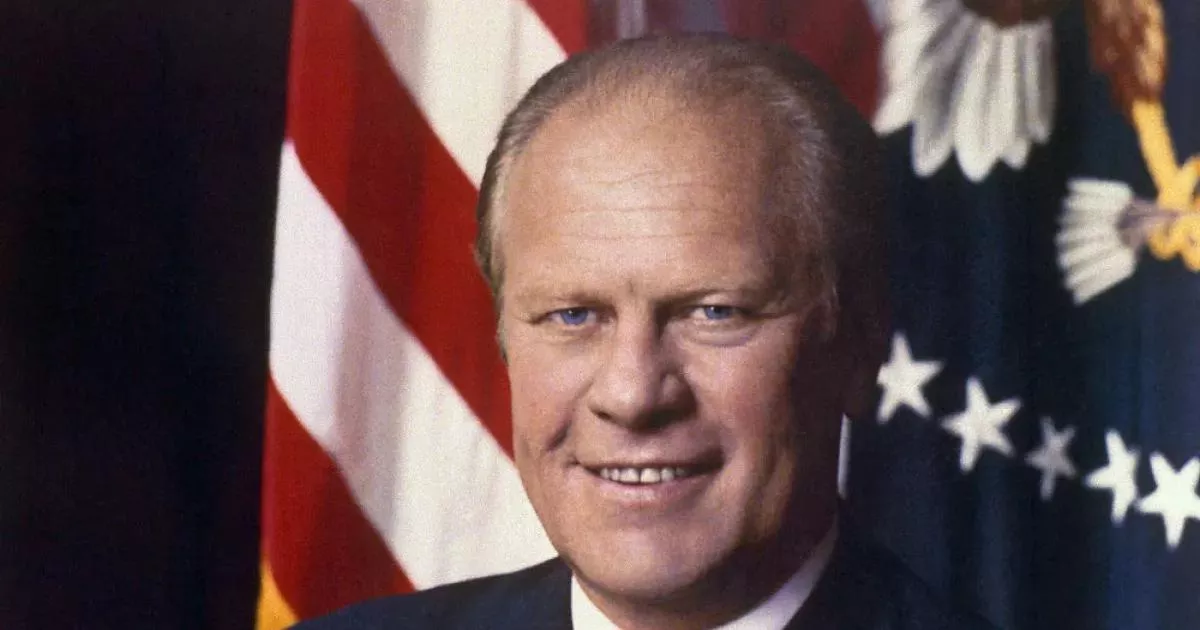Resilience and perseverance in the journey of Gerald Ford. A timeline of obstacles and growth.
Gerald Ford, the 38th U.S. President, served from 1974-1977. A Republican, he ascended to the presidency after Richard Nixon's resignation, having previously served as Nixon's Vice President following Spiro Agnew's resignation. Before becoming Vice President, Ford was a member of the U.S. House of Representatives from 1949 to 1973. His presidency was largely defined by his controversial pardon of Nixon and efforts to combat inflation during an economic downturn.
1935: Ford Hopes to Attend Yale Law School
In 1935, Gerald Ford hoped to attend Yale Law School, but his admission was initially denied due to his coaching responsibilities.
1966: Growing Criticism of Vietnam War Handling
In 1966, criticism grew over the Johnson Administration's handling of the Vietnam War, with Ford and Congressional Republicans expressing concern that the United States was not doing enough to win the war. The 1966 midterm elections resulted in a 47-seat swing in favor of the Republicans.
September 30, 1974: Creation of Economic Policy Board
On September 30, 1974, President Ford created the Economic Policy Board by Executive Order to address economic concerns during his administration.
October 4, 1974: Ford's Speech to Congress Kicking Off "WIN" Campaign
On October 4, 1974, Ford delivered a speech to a joint session of Congress to officially kick off the "WIN" campaign, aimed at curbing inflation and introducing a tax increase proposal.
October 1974: Launch of "Whip Inflation Now" (WIN) Campaign
In October 1974, President Ford initiated the "Whip Inflation Now" (WIN) campaign to combat rising inflation by urging Americans to reduce spending and consumption. The campaign included asking people to wear "WIN" buttons and proposing a one-year, five-percent income tax increase on corporations and wealthy individuals.
December 1974: North Vietnamese Forces Invade Phuoc Long
In December 1974, months after Ford assumed office, North Vietnamese forces invaded the province of Phuoc Long to gauge South Vietnamese and American response.
1974: Congressional Midterm Elections
In 1974, the Congressional midterm elections resulted in the Democratic Party gaining 49 seats from the Republican Party in the House elections, increasing their majority to 291 of the 435 seats. Even Ford's former, reliably Republican House seat was won by a Democrat, Richard Vander Veen.
January 1975: Ford Proposes Tax Reduction to Stimulate Economy
In January 1975, Ford proposed a $16 billion tax reduction for one year to stimulate economic growth while also suggesting spending cuts to avoid inflation.
March 1975: Tax Reduction Act of 1975 Signed into Law
In March 1975, Ford signed the Tax Reduction Act of 1975 into law, which included income tax rebates, contributing to a federal deficit.
March 1975: Ford Frustrated with Israeli Tactics
In early March 1975, during Kissinger's shuttle diplomacy in Israel, Ford expressed frustration with what he considered Israel's "stalling" tactics in negotiations related to the Arab-Israeli conflict.
March 1975: Reassessment of Middle East Policies
On March 24, 1975, Ford informed congressional leaders of the reassessment of the administration's policies in the Middle East, leading to the suspension of further aid to Israel.
April 21, 1975: President Thieu Resigns
On April 21, 1975, South Vietnamese President Thieu resigned, blaming the lack of U.S. support for the fall of his country.
May 1975: Unemployment Reaches Nine Percent
In May 1975, during an economic recession, unemployment reached nine percent, shifting the Ford administration's focus to combating unemployment.
May 1975: Mayaguez Incident
In May 1975, shortly after the fall of Saigon and the Khmer Rouge conquest of Cambodia, Cambodians seized the American merchant ship Mayaguez in international waters. Ford dispatched Marines to rescue the crew, but the Marines landed on the wrong island and met unexpectedly stiff resistance just as, unknown to the U.S., the Mayaguez sailors were being released. Two military transport helicopters carrying the Marines were shot down, resulting in 41 U.S. servicemen killed and 50 wounded. Despite the American losses, the operation was considered a success in the United States.
September 5, 1975: Assassination Attempt by Lynette "Squeaky" Fromme
On September 5, 1975, in Sacramento, California, Lynette "Squeaky" Fromme, a follower of Charles Manson, attempted to assassinate President Ford by pointing a Colt .45-caliber handgun at him. Secret Service agent Larry Buendorf intervened, and Fromme was taken into custody.
November 1975: Adoption of National Security Study Memorandum 200
In November 1975, Ford adopted the global human population control recommendations outlined in National Security Study Memorandum 200 as United States policy, aiming to protect American economic and military interests.
1975: Ford Declines to Bail Out New York City
In 1975, President Ford refused to provide federal support to bail out New York City from bankruptcy, leading to the New York Daily News' "Ford to City: Drop Dead" headline.
1975: Evacuation of Saigon and Vietnamese Refugees
In 1975, during Operation Frequent Wind, 1,373 U.S. citizens and 5,595 Vietnamese and third-country nationals were evacuated from Saigon, and approximately 130,000 Vietnamese refugees were admitted to the United States under the Indochina Migration and Refugee Assistance Act.
1975: Reagan Launches Campaign
In the autumn of 1975, Ronald Reagan launched his campaign for the Republican nomination, challenging Ford's incumbency.
February 5, 1976: Swine Flu Outbreak at Fort Dix
On February 5, 1976, an army recruit at Fort Dix died due to what health officials identified as "swine flu," prompting a public health campaign for mass vaccination.
December 1976: Cancellation of Swine Flu Vaccination Program
In December 1976, the swine flu vaccination program, plagued by delays and public relations issues, was cancelled after vaccinating approximately 25% of the U.S. population.
1976: Loss of Presidential Election
In 1976, Ford lost the presidential election, which historians believe was largely due to the controversy surrounding his pardon of Richard Nixon in 1974.
1976: Ford Runs for Office
In 1976, Ford reluctantly agreed to run for office, facing a challenge for the Republican party nomination from Ronald Reagan.
1976: Federal Deficit
In 1976, the federal deficit amounted to $73.7 billion.
Mentioned in this timeline

John F Kennedy JFK was the th U S President...

Elizabeth II reigned as Queen of the United Kingdom and...

Ronald Reagan the th U S President - was a...
The United States of America is a federal republic located...

The White House located at Pennsylvania Avenue NW in Washington...
California is a U S state on the Pacific Coast...
Trending

2 hours ago Marcus Smart shines with defensive prowess, racking up steals in Lakers' victory.

2 hours ago DeMar DeRozan Trade Rumors: Kings, Hawks Potential Suitors; NBA Picks Targeted

2 hours ago Devin Booker returns from injury as Haywood Highsmith debuts for Suns.

2 hours ago Maxime Raynaud Shines Despite Loss; Praised for Rookie Potential and Shooting.

2 hours ago Rui Hachimura's demand for Lakers' focus surfaces after victories over Warriors and Kings.

2 hours ago Zion Williamson's Status: Lakers Game, Ankle Injury, and Recent Playing Streak
Popular

Hillary Diane Rodham Clinton is a prominent American politician lawyer...

Ken Paxton is an American politician and lawyer serving as...

Jesse Jackson is an American civil rights activist politician and...

Jim Carrey is a Canadian-American actor and comedian celebrated for...

Bill Clinton served as the nd U S President from...

XXXTentacion born Jahseh Dwayne Ricardo Onfroy was a controversial yet...
